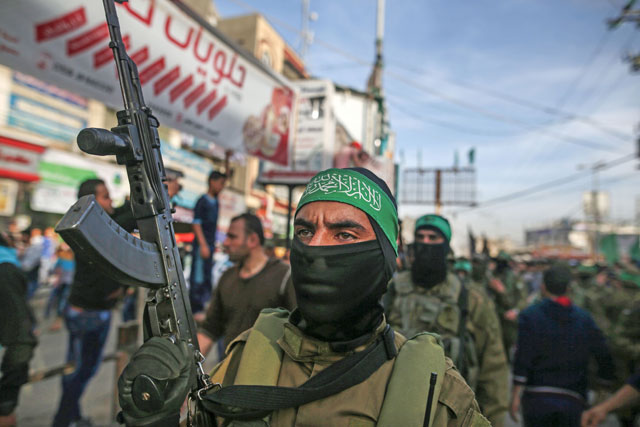NUSEIRAT, Palestinian Territories — The man Hamas called the main suspect in a bomb attack against the Palestinian prime minister in Gaza was killed in an arrest raid on Thursday that also left two members of the Islamist movement's security forces dead.
One of chief suspect Anas Abu Koussa's alleged accomplices in last week's attack was also killed in the raid, according to Hamas.
The raid came after Hamas, which runs the Gaza Strip, launched a manhunt to search for the perpetrators of a roadside bomb that left Prime Minister Rami Hamdallah unhurt on March 13.
But Hamdallah's government, which has already accused Hamas of carrying out the bomb attack, immediately labelled the group's version of events illogical.
Hamas' interior ministry in Gaza earlier announced the deaths and said a third suspect was under arrest, but did not say what motivated Abu Koussa.
It named the two members of the security forced killed as Hammad Abu Swerah and Ziad Al Howajri.
They were killed when dozens of Hamas security force members raided the area of Nuseirat, south of Gaza City, early Thursday, to search for Abu Koussa.
A bloody firefight ensued, leaving the four men dead and a number of others wounded, officials said.
Dozens of new checkpoints were erected throughout the Palestinian enclave with armed security forces searching cars, while Hamas prevented all Palestinians from Gaza from crossing the border into Israel, AFP correspondents said.
A small number of Gazans are given permits to enter Israel, despite the Israeli state’s crippling blockade of the enclave.
Islamists Hamas rules Gaza, but Hamdallah leads the rival Palestinian government based in the West Bank under President Mahmoud Abbas.
The two have been at odds since Hamas violently seized control of Gaza in 2007 and Abbas on Monday accused Hamas of carrying out the attack.
The bomb occurred during a rare visit by Hamdallah to Gaza as the two sides discuss a faltering peace deal.
Palestinian Authority intelligence chief Majid Faraj, who was accompanying Hamdallah, also escaped injury.
The bomb, believed to have weighed around 15 kilogrammes, exploded a few hundred metres from the border with Israel, shortly after Hamdallah’s convoy entered the territory.
A second bomb failed to explode, officials said.
Illogical?
On Monday, Abbas accused Hamas of being behind the blast and said he would take new measures in response, without specifying details.
Abbas has previously taken a series of measures, including reducing electricity payments for Gaza’s two million residents, in what analysts said was an attempt to punish Hamas.
Hamas fiercely denied the allegations and on Wednesday announced they had identified Abu Koussa as the chief suspect.
They did not say what motivated him, but a Hamas security source said Wednesday investigators had arrested and were questioning three people, including two members of the PA-run intelligence services.
Other potential suspects include small radical Salafist Muslim groups opposed to Hamas that operate in the strip.
On Thursday, Hamdallah’s government said Hamas’ version of the day’s events “do not confirm to logic,” casting doubt on the sudden announcement of the suspect and subsequent deadly raid.
The bombing appears to have brought to an end hopes for an already floundering Egyptian-brokered reconciliation deal signed in October between Hamas and Abbas’ Fateh Party, which dominates the PA.
While Hamas did hand over control of Gaza’s borders to the PA, it maintains full control of the rest of the territory, with its police force and armed wing still operating throughout.
The future of that armed wing has proved one of the largest sticking points in implementing the reconciliation agreement.
Previous attempts at reconciliation have failed.
Hamas has fought three wars with Israel since 2008 and is blacklisted as a terrorist organisation by the European Union and the United States.
Many hoped reconciliation could ease worsening humanitarian conditions in the Palestinian enclave, which suffers from electricity shortages and a lack of other infrastructure, including clean water.
